In October 2020, Mr. Abu Imran, a 2010 batch IAS officer, assumed the role of Deputy Commissioner in Latehar district, Jharkhand. During his tenure, under his capable leadership, all government welfare schemes thrived. Concurrently, Latehar welcomed another influential figure, Mr. Indu Bhusan, a Rural Development and Convergence Expert (RD&CE) who served under the National Rurban Mission (NRuM) in the same timeframe.
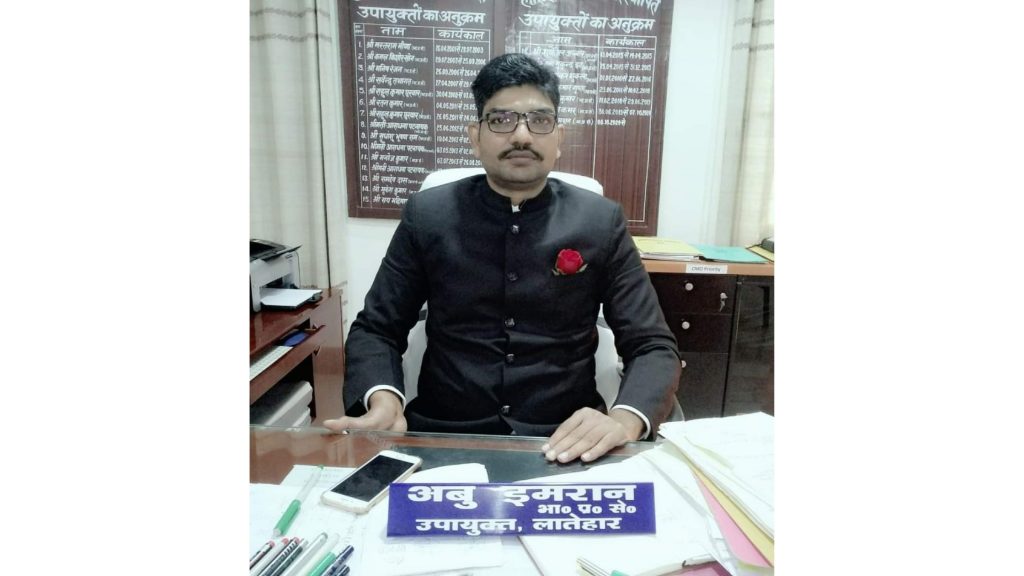
The Rurban Mission aims to drive local economic development, improve essential services, and establish well-designed Rurban clusters. In pursuit of progressive growth, the district administration is prioritizing Livelihood, Social Infrastructure, Health, and Nutrition. The team has taken the lead in developing the foundational model for the Rurban Cluster.
Latehar is an agro-based district covered by forests, where villagers rely on forest resources such as sal leaves and bamboo for their livelihoods. Unemployment and limited opportunities for alternative means of income have posed significant challenges to the local population. However, the flagship program of the central movement has played a transformative role, generating livelihood opportunities and bringing about a remarkable improvement in people’s living standards.
In the following sections, we will delve into some of the proactive initiatives undertaken by the district administration as we progress through this article.
Table of Contents
Solar LED lights brighten tribal villages
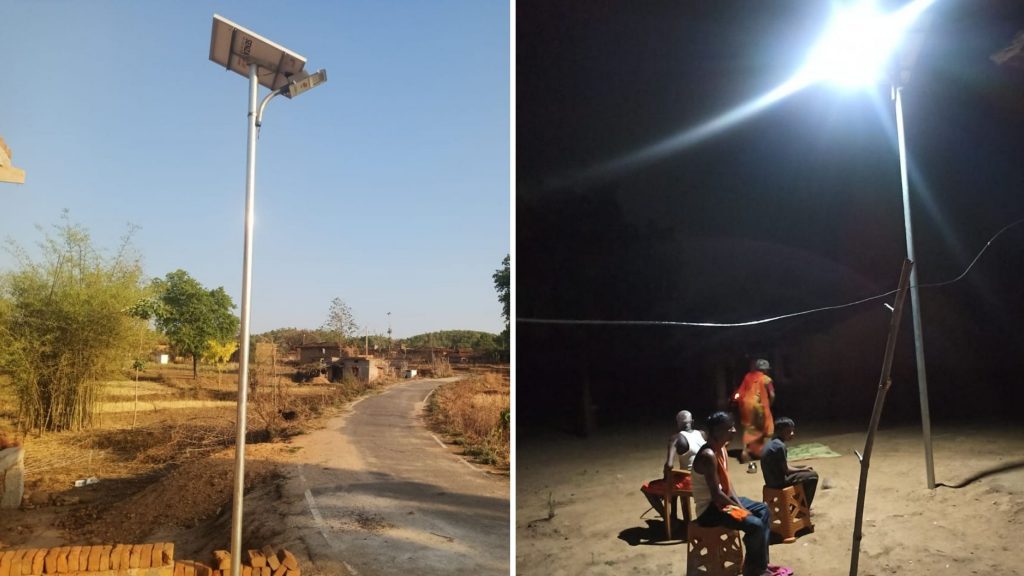
The Mangra Rurban Cluster, part of the Shyama Prasad Mukherjee Rurban Mission, has witnessed a remarkable transformation. Every road and lane now radiates with the glow of light, instilling a sense of security among the cluster’s residents. Previously plagued by concerns of wildlife encounters, the installation of 299 solar street lights across the 11 villages has brought about a significant change. These lights illuminate the surroundings for approximately 10 to 12 hours each night, automatically switching on as the sun sets.
The positive impact of the solar lights extends beyond the streets, encompassing public spaces such as community buildings, the Panchayat Secretariat, religious sites, and health centers. Even the Parhiya Tola area, home to a primitive tribe, now enjoys the benefits of illumination. The presence of solar lights has created a safer environment for farmers, women, and children, enabling them to move about with confidence during nighttime hours. Children take delight in playing carrom and other outdoor games after dusk.
One village in particular, Muru, frequently witnesses the passage of a herd of elephants. Previously, these encounters often resulted in damage to houses and injuries to residents. However, the availability of solar lights has significantly mitigated the issue. With the village’s inhabitants remaining alert upon sighting any wild animals from a distance, the problem has become more manageable, ensuring the safety of both humans and wildlife alike.
Transforming Anganwadi Centers into Play School Models
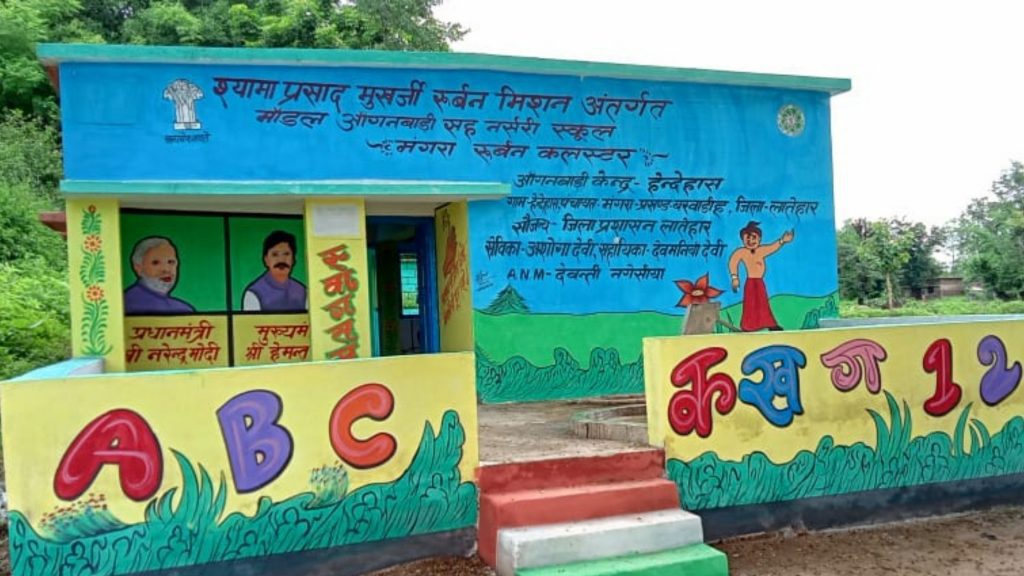
In the past, numerous Anganwadi centers in the district were non-functional, lacking the basic facilities provided by the Social Welfare Department. As a consequence, children’s daily attendance remained consistently low. Recognizing this issue, the Deputy Commissioner took proactive measures to establish well-equipped Anganwadi centers in tribal areas. Today, these centers not only offer essential pre-school facilities but also provide necessary equipment and interactive learning materials.
The refurbished Anganwadi centers boast vibrant colors, dedicated playrooms, modern classrooms, well-equipped kitchens, and child-friendly toilets. The addition of attractive furniture creates a welcoming environment that stimulates positive engagement. The walls are adorned with interactive paintings featuring pictures of vegetables, fruits, animals, and more, presented in both Hindi and English to facilitate learning and comprehension.
Moreover, Anganwadi sevikas have received comprehensive training from the concerned department. Inaugurating 17 Anganwadi centers in the Tribal Rurban Cluster, the Deputy Commissioner has witnessed a remarkable increase in children’s attendance. These centers now provide a nurturing educational atmosphere, essential nutritional supplements for children, pregnant and lactating women, counseling services, vaccinations, and various other support services.
Women Farmers Cultivate Lemongrass and Tulsi, Inspiring Hundreds
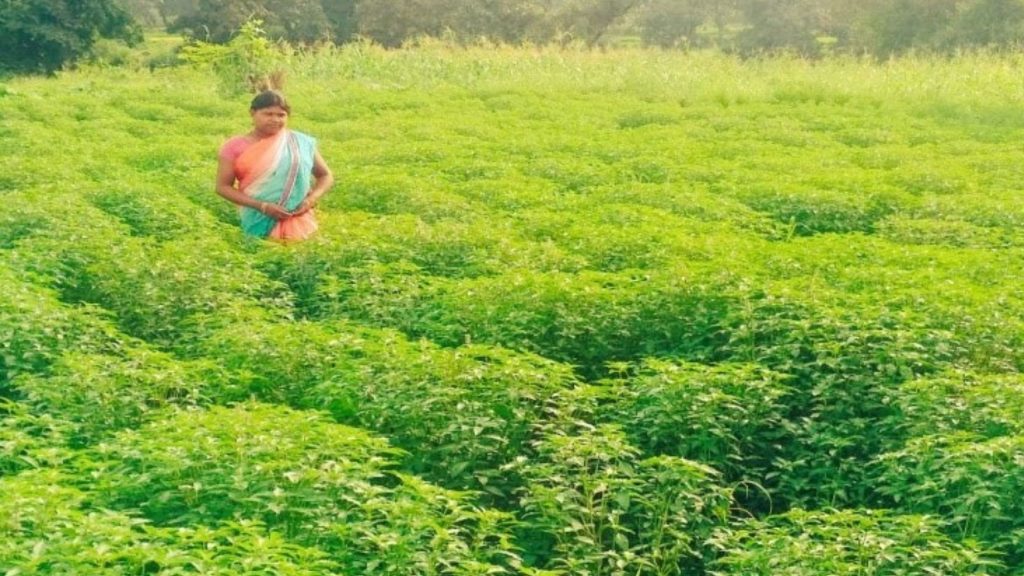
"Women farmers are becoming an inspiration for hundreds of people by cultivating Lemongrass and Tulsi in a barren land."
In a remarkable display of resilience and determination, women farmers in the Mangra Rurban cluster have transformed barren land into a flourishing cultivation ground for Lemongrass and Tulsi. These medicinal plants now thrive on what was once unused and infertile land, symbolizing a remarkable turnaround. Previously disheartened, the farmers have regained their confidence and trust through this remarkable feat. The cultivation of Lemongrass and Tulsi has not only rejuvenated the land but also given a new sense of identity to the women in the area.
The Rurban Cluster Mangra has placed great emphasis on leveraging advanced farming technologies and connecting women farmers with modern agricultural practices. As part of the Rurban Mission, a Lemon Grass Processing Unit has been established in Amdiha Village by the Jharkhand State Livelihood Promotion Society, empowering women farmers to manufacture medicinal tea, hand wash, soap, and other products using Lemongrass leaves. This initiative aims to promote self-employment and discourage migration within the Rurban clusters. The deep and strong roots of Lemongrass help prevent soil erosion, making it a valuable asset that is easily sold in the market. Moreover, the presence of Lemongrass naturally deters mosquitoes from breeding in the area.
With land ownership, access to technology, credit, and agricultural training, women farmers now experience a significant boost in their livelihoods. The production of Tulsi and Lemongrass has witnessed remarkable growth within the cluster. More than 250 women farmers have been supported by the Rurban mission in their pursuit of a better livelihood through Tulsi and Lemongrass cultivation. The identified land areas, ranging from 25 decimals to 1 acre, have been utilized for this purpose. The barren lands associated with the members of SakhiMandal were carefully marked, and the first batch of Tulsi and Lemongrass was successfully planted across approximately 17 acres. The sale of 1,150 liters of oil from Lemongrass yielded a net profit of Rs. 55,000, while Tulsi oil sales amounted to Rs. 22,500, significantly contributing to the farmers’ earnings.
Transforming Lives through Puffed Rice Production: A Story of Empowerment
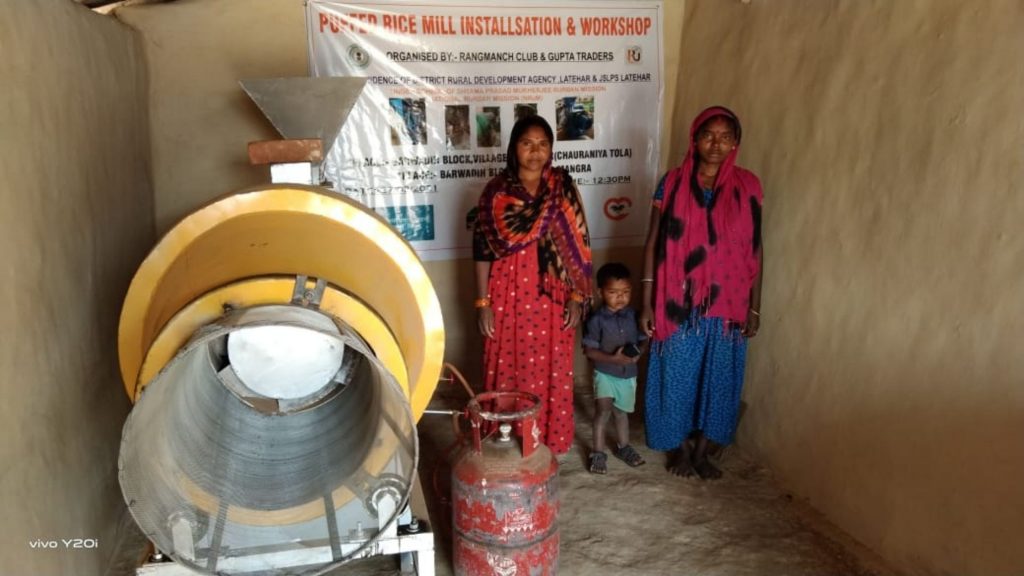
In search of sustainable livelihood options for the community, the Rurban mission identified a promising opportunity in puffed rice production. Recognizing the potential, the mission engaged closely with the women of Sakhi Mandal, a dedicated self-help group. Through extensive consultations and meetings, it became evident that puffed rice production could offer a viable alternative to their existing livelihoods.
SHG Women’s Produced Puffed Rice
To support this endeavor, the mission facilitated the establishment of production units for two groups. Comprehensive training programs were conducted to equip the members with the necessary skills. Additionally, arrangements were made for the procurement of rice, packaging materials, hand sealing machines, and LPG gas fuels, ensuring a smooth production process for the Sakhi Mandal members.
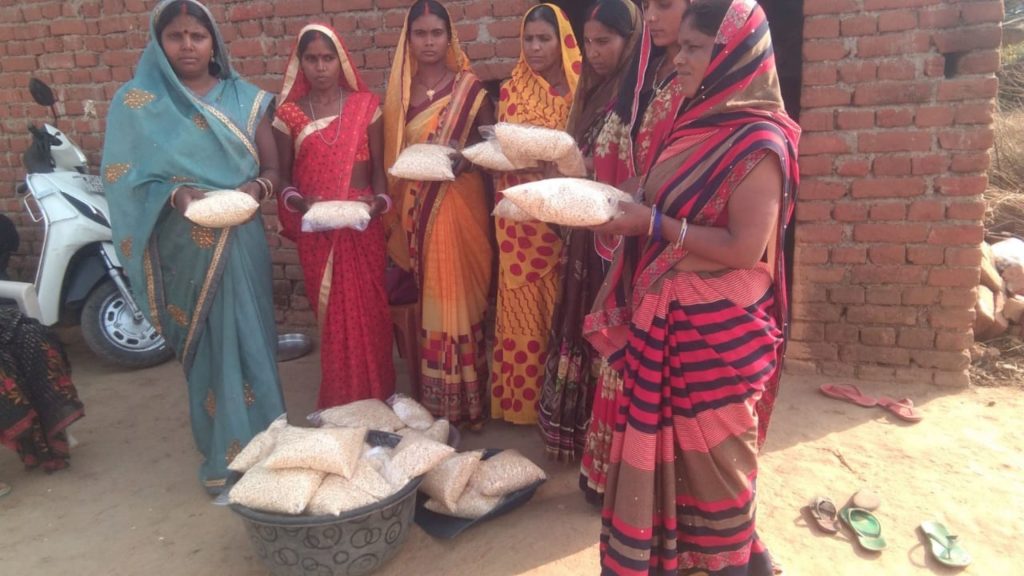
The impact of this initiative has been truly transformative. Upon reflecting on their journey with the Rurban mission, tears of gratitude well up in the eyes of the group members. Gone are the days when they had to rely on moneylenders to meet their household needs. No longer do family members need to migrate for prolonged periods. Instead, a sense of unity pervades the processing unit, where everyone works diligently together. The finished puffed rice products are sold in the local market, bringing economic stability and a renewed sense of purpose.
Through their collective efforts, these women have found solutions to their once-insurmountable challenges. Education has become a priority, with children attending school regularly, while access to nutritious food ensures their well-being. This inspiring success story showcases the transformative power of community-based initiatives and the profound impact they can have on individuals and their families.
Empowering Lives: Women Transforming Their Community
Constructed Paver Block Road Connecting Villages
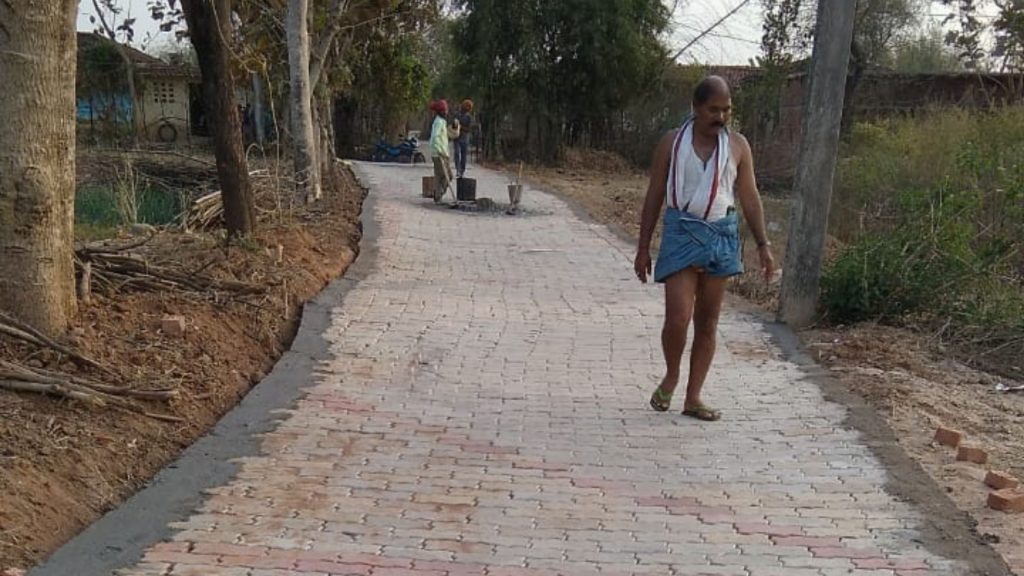
A remarkable transformation is underway in the remote areas of the Mangra Rurban Cluster. Gone are the days when infrastructure was scarce, and muddy kutcha roads hindered progress. Under the visionary leadership of the Deputy Commissioner, the landscape has changed. Vibrant paver block roads now replace the muddy tracks, enabling smooth vehicular movement and ensuring the safe passage of school-going children. Mobile phones and electricity have become common in every household, while solar lights illuminate the 11 villages of the Mangra Rurban Cluster. The challenges faced during the rainy season, where walking was arduous and muddy, have been overcome with the construction of 83 units of paver block roads. Villagers can now navigate their surroundings effortlessly, even during the night.
A multitude of transformative initiatives has been set in motion, including the establishment of model schools in the villages, solar-based irrigation systems, cold storage facilities, rural haats, healthcare centers, libraries, and science laboratories. These projects are approved and expected to commence soon, fostering development and progress throughout the Mangra Rurban Cluster.
"The women of the Parhiya community, a primitive tribe, have changed their lives by making leaf plates and are now passing on their skills to their daughters."
In the distant villages of Mangra and Ukkamad, located 65 kilometers away in Latehar district, 24 women have embarked on a journey of transformation by making dona-pattals (leaf plates). These eco-friendly plates are in high demand, particularly for weddings, and have become a significant source of income for these women. Through the Shyama Prasad Mukherjee Rurban Mission, the women of the Parhiya community, who are on the verge of extinction and have drawn UNESCO’s concern, have been empowered through enhanced livelihood opportunities.
To provide local employment for the women of the Pragati Self-Help Group and Chandni Self-Help Group, two sewing centers were established as part of the Rurban mission. In the past, the process of stitching saal and mahulam leaves together to prepare the pattals was time-consuming. However, with the introduction of modern machines, the production has become more efficient. This endeavor has not only improved the economic status of these women but has also elevated their social standing within the community.
SHG Woman Displaying Machine-Made Dona-Pattal
These empowered women, trained by the department, now produce dona-pattals using machines, contributing to environmental conservation while advancing women’s empowerment. Their efforts have inspired other women in the area to follow suit. Together, the women of the Pragati Self-Help Group and Chandni Self-Help Group craft dona-pattals using the machines. Kunti Devi, one of the women, shared her journey, highlighting the positive impact on her household’s financial stability. Earning 100 to 200 rupees a day, she now independently manages daily expenses, purchases groceries, and supports her children’s education. Her achievements are a testament to the honor and pride she feels in her newfound role.
attal through the machine. Kunti Devi told that it was difficult to run the house on the earnings of her husband Dukhan Parhiya alone. Now she herself earns 100 to 200 rupees a day. He himself buys vegetables and vegetables and other things. Taking care of the education expenses of the children. It is an honor to do so.
Also read:
- Ethnic Farms Are Every Bit The Village You Want To Visit
- Rural Places that can be Visited in India
- Importance of Environment to Human Life
Author:
Indu Bhushan Sinha, RD&CE, NRuM, Latehar


